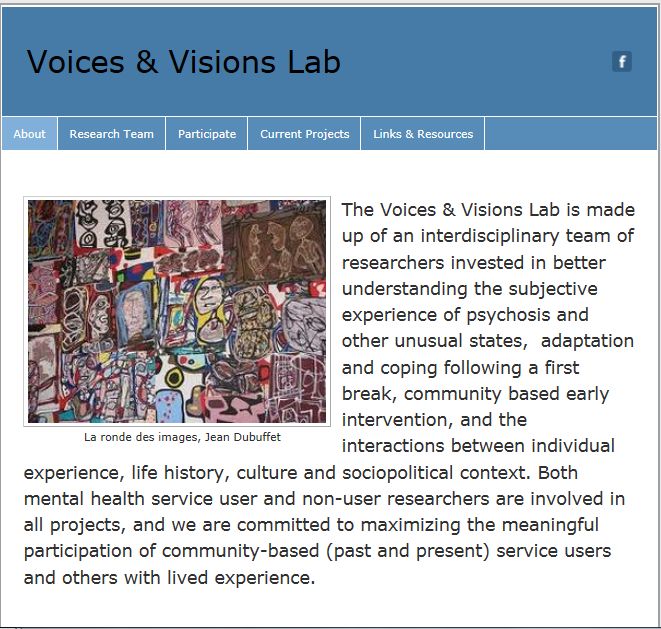Nev Jones, joint founder of Voices and Visions Lab and member of the Hearing the Voice Advisory Board, writes: My colleague Mona Shattell and I are very pleased to announce the launch of several new research projects in collaboration with members of Hearing the Voice.
Our first project—the Phenomenology of Psychosis and Unusual Experiences—aims to better understand the differences or similarities between the subjective experience of phenomena often parsed in highly artificial ways (e.g. “thought insertion” vs “auditory hallucinations”) both within and across different ‘psychiatric’ (e.g. schizophrenia, PTSD) and ‘medical’ (e.g. epilepsy, hearing-loss related auditory hallucinations) diagnoses. We also plan to closely attend to the dynamic relationships between phenomena (for example, dynamic interactions between perceptual changes and spiritual beliefs) and the role of individuals’ “agency” and intentionality in shaping their experiences. We are interested in talking with anyone who has had these experiences, regardless of which country you are live in. If you’re interested in find out more, please see our recruitment information here.
Our second project—a longitudinal qualitative study of individuals who have very recently experienced a first break—will expand on some of the themes explored in our phenomenology project, but also investigate participants’ experiences of the clinic they attend, their relationships with clinicians, family members, peers and romantic partners, experiences of sexuality, engagement at school and/or work, and various cultural and sociopolitical influences on their own public and private framing of their “diagnosis” or mental health experiences. In addition, we will be interviewing diverse clinicians involved in their first episode intervention program and (hopefully) organizing a semi-autonomous literary arts project with participants.
Methodological highlights include:
(1) For our phenomenology project, several of the core researchers (myself included) will serve as both interviewers and interviewees (though no one will “code” their own interview), in an effort to (a) subject researchers to a roughly similar process of hermeneutic ‘appropriation’ and (b) increase team insights as to the slippage between participant narratives and researchers’ analyses.
(2) An unusually large number of our core researchers have experienced psychosis, voices, and other unusual experiences and received ‘schizophrenia’ spectrum diagnoses, various mental health service experiences (e.g. involuntary hospitalization) and (in my case) personally “graduated” from a specialty first episode intervention program.
(3) Participants will be encouraged to get as involved as they want and will minimally be given the opportunity to (a) request additional interviews; (b) review and clarify/contextualize interview transcripts; (c) review and comment on journal article drafts prior to submission.
(4) Design, coding and analysis is (or will be) truly, meaningfully interdisciplinary. Thus we have folks with backgrounds in psychology, psychiatric nursing, medical anthropology, and the medical humanities. Although data may be used in different ways, our plan for many of our analyses is to adapt Sweeney et al.’s “multiple coding” procedure, using a mix of researchers with diverse experiences of psychosis, and different disciplinary and clinical backgrounds.
Regular updates will be posted on the Hearing the Voice web site, but please also keep in touch with us through the Voices and Visions Lab.

